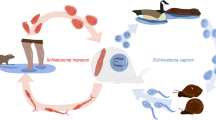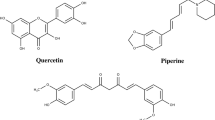Abstract
Antischistosomal properties of mefloquine against Schistosoma japonicum have been further studied. A total of 260 mice were divided into four batches, and three batches of them were infected percutaneously with 40 S. japonicum cercariae. In the remaining batch, mice were infected with 20, 40, or 80 S. japonicum cercariae. Other 45 hamster, divided into two batches, were each infected two or three times with 50 S. japonicum cercariae at days 0 and 7 or 0, 14, and 21. The infected mice and hamsters were treated orally with single doses of mefloquine or praziquantel at various intervals post-infection, while infected but untreated mice and hamsters served as control. All treated animals were killed 4 weeks post-treatment for assessment of effect. In hamsters concurrently infected with 14- and 21-day-old or 14-, 21-, and 35-day-old schistosomes and treated orally with mefloquine at a single dose of 100 and 200 mg/kg, the total worm burdens were significantly lower than that of control (P < 0.05 or P < 0.01) with worm burden reductions of 45.4% and 89.9% as well as 82.5% and 90.6%, respectively. In the first batch of mice treated with mefloquine and four structurally related amino alcohol antimalarials 5 weeks post-infection at a single dose of 400 mg/kg, mefloquine, quinine, and quinidine possessed similar potential effect with total worm burden reductions of 80.9–90.3%, while halofantrine and lumefantrine showed moderate and poor effect with total worm burden reductions of 67.5% and 38.4%, respectively. In the second batch of mice infected with 20, 40, and 80 S. japonicum cercariae and treated orally with mefloquine at a single dose of 200 and 400 mg/kg 5 weeks post-infection, similar effects were seen in groups of mice with various infection intensity, the total worm burden reductions were 59.9–73.0% (200 mg/kg) and 85.0–89.1% (400 mg/kg). In the other two batches of mice infected with various stages of schistosomes and treated orally with mefloquine and praziquantel at a single dose of 200 or 400 mg/kg, potential and moderate effects of praziquantel against d0 worms (3-h-old) and adult worms (28- and 35-day-old) with total worm burden reductions of 83.6–95.6% and 42.4–69.3% were observed, but no effect against various stages of juvenile schistosome was seen. Under the two single doses used, mefloquine exhibited no effect against d0 worms, but showed moderate or potential effect against various stages of juvenile and adult schistosomes with total worm burden reductions of 56.3–89.1% (200 mg/kg) and 81.1–100% (400 mg/kg). The results indicate that mefloquine shows potential effect on hamsters concurrently infected with various stages of juvenile and adult S. japonicum; among the four structurally related amino alcohol antimalarials tested, quinine and its isomer quinidine exhibit potential effect against adult S. japonicum similar to that of mefloquine, while halofantrine and lumefantrine posses moderate and poor effect; no impact of infection intensity on the effect of mefloquine against schistosomes was observed in mice; under the same dose level, the effect of mefloquine against development stages of juvenile and adult S. japonicum is superior to that of praziquantel.

Similar content being viewed by others
References
Doenhoff MJ, Sabah AA, Fletcher C, Webbe G, Bain J (1987) Evidence for an immune-dependent action of praziquantel on Schistosoma mansoni in mice. Trans R Soc Trop Med Hyg 81:947–951
Fallon PG, Hamilton JV, Doenhoff MJ (1995) Efficacy of treatment of murine Schistosoma mansoni infections with praziquantel and oxamniquine correlates with infection intensity: role of host antibody. Parasitology 111(Pt 1):59–66
Keiser J, Chollet J, Xiao SH, Mei JY, Jiao PY, Utzinger J, Tanner M (2009) Mefloquine—an aminoalcohol with promising antischistosomal properties in mice. PLoS Negl Trop Dis 3:e350
Nessim NG, Demerdash Z (2000) Correlation between infection intensity, serum immunologlobuin profile, cellular immunity and the efficacy of treatment with praziquantel in murine Schistosomiasis mansoni. Arzneimittelforschung 50:173–177
Sabah AA, Fletcher C, Webbe G, Doenhoff MJ (1986) Schistosoma mansoni: chemotherapy of infections of different ages. Exp Parasitol 61:294–230
Utzinger J, Chollet J, You J, Mei J, Tanner M, Xiao S (2001) Effect of combined treatment with praziquantel and artemether on Schistosoma japonicum and Schistosoma mansoni in experimentally infected animals. Acta Trop 80:9–18
Utzinger J, Xiao SH, Tanner M, Keiser J (2007) Artemisinins for schistosomiasis and beyond. Curr Opin Investig Drugs 8:105–116
Xiao SH (2005) Development of antischistosomal drugs in China, with particular consideration to praziquantel and the artemisinins. Acta Tropica 96:153–167
Xiao SH (2008) Impact of host factors on the schistosome-killing process induced by praziquantel. Chin J Parasitol Parasitic Dis 26:217–222
Xiao SH, Zhang CW (2009) Histopapthological alteration of juvenile Schistosoma japonicum in mice following treatment with single-dose mefloquine. Parasitol Res (in press)
Xiao SH, Yue WJ, Yang YQ, You JQ (1987) Susceptibility of Schistosoma japonicum of different developmental stages to praziquantel. Chin Med J 10:759–768
Xiao SH, You JQ, Mei JY, Hu YQ, Zhou DH, Catto BA (1998) In vitro and in vivo effect of levopraziquantel, dextropraziquantel versus racemic praziquantel on different developmental stages of Schistosoma japonicum. Chin Parasitol Parasit Dis 16:335–341
Xiao S, Chollet J, Booth M, Weiss NA, Tanner M (1999) Therapeutic effect of praziquantel enantiomers in mice infected with Schistosoma mansoni. Trans R Soc Trop Med Hyg 93:324–325
Xiao SH, Booth M, Tanner M (2000a) The prophylactic effects of artemether against Schistosoma japonicum infections. Parasitol Today 16:122–126
Xiao SH, You JQ, Guo HF, Jiao PY, Tanner M (2000b) Effect of praziquantel together with artemether on Schistosoma japonicum parasites of different ages in rabbits. Parasitol Int 49:25–30
Xiao SH, Chollet J, Utzinger J, Mei JY, Jiao PY, Keiser J, Tanner M (2009a) Effect of single-dose oral mefloquine on the morphology of adult Schistosoma japonicum in mice. Parasitol Res 105:853–861
Xiao SH, May JY, Jiao PY (2009b) The in vitro effect of mefloquine and praziquantel against juvenile and adult Schistosoma japonicum. Parasitol Res (in press)
Yolles TK, Morre DV, DeGusti DL, Ripsom CA, Meleney MS (1947) A technique for the perfusion of laboratory animals for the recovery of schistasomes. J Parasitol 33:419–426
Yue WJ, You JQ, Mei JY (1985) Prophylactic activity of praziquantel in animals infected with Schistosoma japonicum. Acta Pharmacol Sin 6:186–188
Yue WJ, Xiao SH, Mei JY (1989) Relationship between the effects of praziquantel on mice and rabbits with different intensities of Schistosoma japonicum infection and humoral immunity levels of the host. Acta Pharmacol Sin 10:476–479
Yue WJ, Xiao SH, Mei JY (1990) Alteration of antibody levels in rabbits with Schistosomiasis japonica and treated with praziquantel. Chin J Schisto Control 2:54–56
Zhang CW, Xiao SH, Utzinger J, Chollet J, Keiser J, Tanner M (2009) Histopathological changes in adult Schistosoma japonicum harbored in mice treated with a single dose of mefloquine. Parasitol Res 104:1407–1416
Acknowledgments
This investigation received financial support from the National Institute of Parasitic Diseases, Chinese Center for Disease Control and Prevention (Shanghai, China).
Author information
Authors and Affiliations
Corresponding author
Rights and permissions
About this article
Cite this article
Xiao, Sh., Mei, Jy. & Jiao, Py. Further study on mefloquine concerning several aspects in experimental treatment of mice and hamsters infected with Schistosoma japonicum . Parasitol Res 106, 131–138 (2009). https://doi.org/10.1007/s00436-009-1640-5
Received:
Accepted:
Published:
Issue Date:
DOI: https://doi.org/10.1007/s00436-009-1640-5




